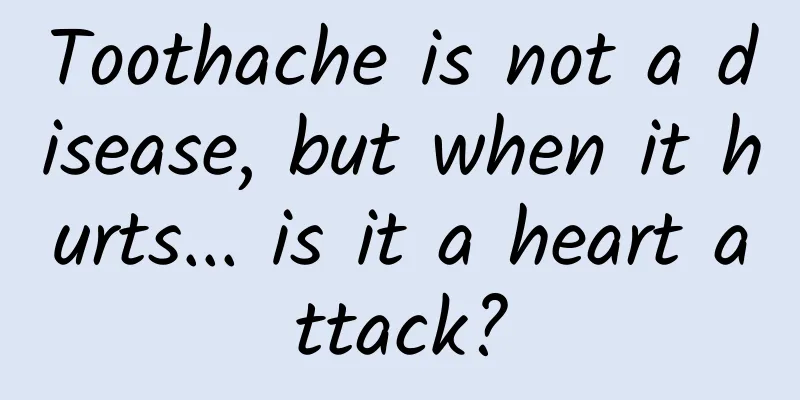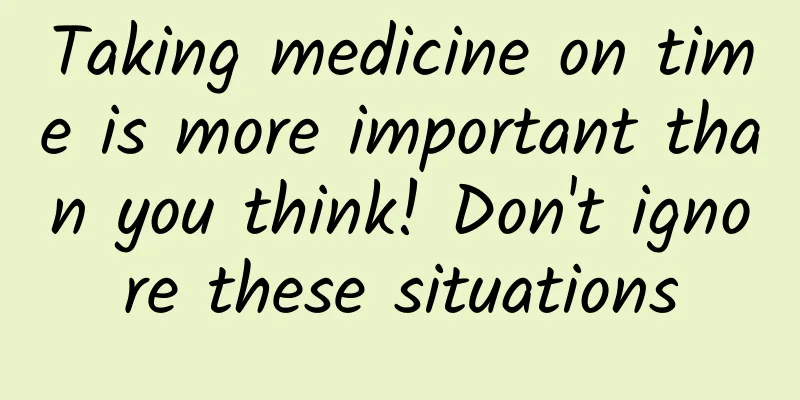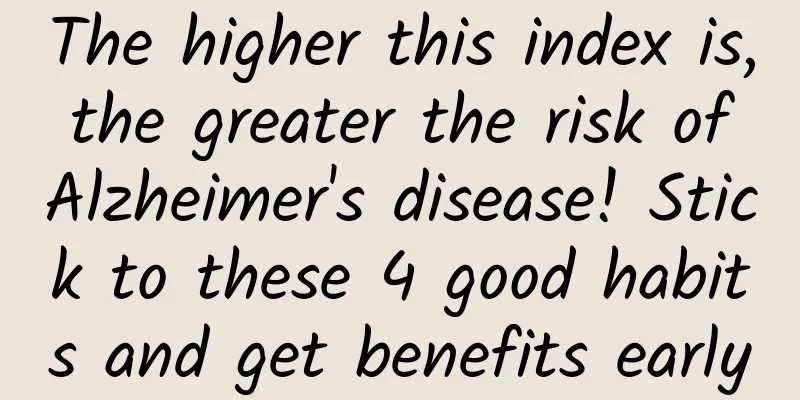Toothache is not a disease, but when it hurts... is it a heart attack?

|
Review expert: Wang Xin, deputy chief physician of the Department of Cardiology, Jilin People's Hospital People generally think that minor illnesses such as diarrhea and toothache will go away if they endure it, and there is no need to seek medical treatment. However, little do people know that such seemingly minor illnesses are sometimes the precursors of serious diseases. If they are not treated immediately, they may lose their lives. Not long ago, a 49-year-old male patient went to the local health center for treatment due to vomiting. Because the patient's external symptoms were severe vomiting accompanied by chest tightness and nausea, the doctor initially diagnosed him with acute gastroenteritis. However, after the infusion, the patient went into shock, and the rescue of the doctor at the health center was in vain. The patient was later taken away by 120. The hospital doctor diagnosed him with myocardial infarction, but he missed the best rescue time and eventually died.
This is not an isolated case. According to statistics, about 30% of patients with acute myocardial infarction will show gastrointestinal symptoms such as abdominal pain, diarrhea, and bloating when the disease occurs, which will cause doctors to misdiagnose them as acute gastroenteritis, causing patients to miss the best treatment time . 01 Myocardial infarction may be misdiagnosed as these conditions In addition to the above cases where myocardial infarction patients were misdiagnosed as digestive tract diseases due to vomiting and diarrhea, myocardial infarction also has symptoms such as toothache, shoulder and back pain, epilepsy, and fever . In other words, when these symptoms occur, you should also pay attention to whether it is a myocardial infarction. So why are myocardial infarctions misdiagnosed as these diseases? Let's find out together. Digestive tract diseases First, myocardial infarction is most likely to be misdiagnosed as acute gastroenteritis and other digestive tract diseases. The main reason is that when a patient has a myocardial infarction, the vagus nerve is stimulated by the myocardial ischemia reflex, which will cause gastrointestinal symptoms such as nausea and vomiting. The pain area caused by myocardial infarction in the human body is close to the area of abdominal pain, so doctors are likely to misdiagnose myocardial infarction as acute gastroenteritis, peptic ulcer, etc., but patients usually do not have tenderness in the upper abdomen. Source: Sohu toothache In addition to digestive tract diseases, toothache may also be a manifestation of myocardial infarction. The reason is that the nerves that control toothache and the nerves that cause angina pectoris come from the same nerve at the spinal cord level. If the location of the toothache is vague, and you can't find the specific tooth that hurts, and it feels like a painful toothache, and pressing the toothache does not significantly increase the pain, or in addition to the toothache, there are also symptoms such as chest tightness, shortness of breath, sweating, and discomfort in the heart, then you should pay attention to whether it may be angina pectoris or radiating pain caused by myocardial infarction. This is because if it is a simple toothache, pressing the tooth area will aggravate the toothache, so a preliminary judgment can be made through simple pressing. In short, if you don't usually have toothache, but suddenly have related symptoms, and you usually have risk factors for coronary heart disease, you should consider angina pectoris and even the possibility of myocardial infarction. Limb pain Angina pectoris or myocardial infarction sometimes causes pain in the left arm and left shoulder, and sometimes it also reflects to the right arm. This pain is generally dull rather than severe, usually limited to the inner side of the forearm, and may radiate to the little finger and ring finger. Especially when accompanied by chest tightness and shortness of breath, be more alert to myocardial infarction. An important basis for judging that these are not muscle pains but myocardial infarctions is that when you feel pain in these places, pressing with your fingers does not aggravate the pain. At this time, you must pay special attention to whether it is a myocardial infarction. This is because if the pain is caused by myocardial infarction, the source of the pain is in the heart, and pressing the shoulder will not aggravate the pain. If it is simple shoulder pain, there will be obvious tenderness when pressing. This is an important factor in judging whether limb pain is angina pectoris. Ischemic Attack Myocardial infarction patients may also be misdiagnosed as transient ischemic attack. Especially patients with diabetes and hypertension, these patients will have varying degrees of arteriosclerosis and may have problems with insufficient blood supply to the brain. After a myocardial infarction occurs, the arrhythmia caused by myocardial infarction will affect the heart's blood supply to the whole body, or due to myocardial infarction in the right ventricle, it will also lead to a decrease in the amount of blood returning to the heart, which will then cause hypotension. The brain will have a serious lack of blood supply, and the human body will experience dizziness, blurred vision, headache, convulsions, coma and other mental system symptoms. If the patient does not often have symptoms such as chest pain, it is easy to be misdiagnosed as cardiovascular and cerebrovascular disease. Especially epilepsy, transient ischemic attack, etc. For patients with both coronary heart disease and cerebrovascular disease, careful identification should be taken. Respiratory tract infections This is because myocardial infarction causes myocardial cell necrosis, and the necrotic substances stimulate the heat source, causing fever. This causes the body temperature to rise. This fever symptom usually appears 24 to 48 hours after myocardial infarction, so the number of cases where myocardial infarction is misdiagnosed as fever and other related symptoms is relatively small compared to the cases of the other symptoms mentioned above. How to determine whether it is a heart attack? The following symptoms are the most common clinical manifestations of myocardial infarction: severe chest pain, chest tightness, chest discomfort, palpitations, etc., especially squeezing pain or tightness in the precordial area that lasts for more than 30 minutes, accompanied by a feeling of impending death . When these situations occur, myocardial infarction should be considered first to avoid delaying the golden rescue time. We should pay special attention to the middle-aged and elderly people. When they have severe diarrhea or vomiting without eating related foods or their environment has not changed significantly, we should pay attention to whether it is a heart attack . When the middle-aged and elderly people have pain in certain parts of the body without any warning and without tenderness, we must also pay attention to whether there is a problem with the heart. Source: Sohu In addition to the middle-aged and elderly people, young people should also pay attention. If they suddenly experience arrhythmia, sweating or vomiting after excessive activity or fatigue, they should seek medical attention in time, as it may be a myocardial infarction . How to deal with heart attack ? Because myocardial infarction is a critical illness, if not treated in time, serious complications such as malignant arrhythmia, cardiogenic shock, heart rupture, etc. may occur, which may be life-threatening. Therefore, self-help methods can be taken after the onset of the disease, mainly as follows: 1. Call 120 for emergency treatment immediately : If you suddenly experience chest pain, or if you have known heart disease and suddenly experience chest pain, shoulder and back pain, upper abdominal pain, dizziness, nausea, etc., you can take 1 nitroglycerin tablet or 10 quick-acting heart-saving pills sublingually. If the above symptoms are not significantly relieved after 5 to 10 minutes, call 120 for emergency treatment immediately. 2. Regulate your emotions . While waiting for help, you should try to stay calm, actively adjust your anxiety, and take slow, deep breaths to help lower your heart rate. Reduce activities, do not walk or drive frequently, stay in bed or lie flat on the ground to prevent accidents caused by falls, which is also beneficial to the blood supply to the head. 3. Chew antiplatelet drugs . You can chew aspirin as required by medical staff, and take other antiplatelet drugs as soon as possible, such as ticagrelor, clopidogrel, etc., which can inhibit the formation of thrombus blocking blood vessels or further increase the area of thrombus, and also provide safety protection for interventional surgery after arriving at the hospital. Because myocardial infarction develops quickly and has a high mortality rate, it is necessary for us to master some basic medical knowledge. When it suddenly happens to someone around us, we must quickly make correct judgments and provide timely treatment without any regrets. |
<<: Who is the first animal in the world to make active sounds? When life began to chirp
>>: Dark matter halo: New discovery? It may help humans understand the evolution of the universe!
Recommend
Enlight Media takes steps to "cut down the vassal states": TV division disbands and reorganizes
As a first-tier film company in China, Enlight Me...
How to apply for Shanxi Health Code? Shanxi Health Code application and usage instructions tutorial!
How to apply for Shanxi Health Code? Shanxi Healt...
Taking a book sales website as an example, let’s talk about how to increase the paid conversion rate
Paid conversion means: getting users to consume a...
China Passenger Car Association: In December 2024, the national passenger car manufacturers wholesaled 3.075 million vehicles, a year-on-year increase of 12.3% and a month-on-month increase of 4.5%
According to data released by the China Passenger...
Ganfanren Yiyi_How to create a vertical account for beginners video
The course from Ganfanren Yiyi teaches beginners ...
What sparks will the collision of "Internet + Robots" bring? Wasu Robotics uses big data cloud platform to connect the "brains" of intelligent manufacturing
The intelligent manufacturing demonstration produ...
Why can't iPhones be assembled in the United States? They don't even have all the screws
Even though U.S. President Trump personally warne...
5 minutes, 10 minutes, half an hour... I am still constipated. What's wrong?
How long do you spend in the toilet each time? 5 ...
How to create the Shaoguan food ordering mini program? How much does it cost to develop a food ordering app?
The catering industry has become the first choice...
These functions of mobile phones are very practical but you have ignored them
More than a decade ago, it was still the era of fe...
Can't stop having fun in the snow? Here are some emergency tips to keep in mind →
Winter vacation overlaps with the Spring Festival...
4 major pitfalls of short video operations in the education industry
In 2020, if large, medium and small enterprises d...
Another mysterious "aliens" has visited Earth! It's visible to the naked eye!
Following Comet Neowise in 2020 and Comet Leonard...
Can WeChat groups be rented out? It is true that you can make money lying down, but don’t do it.
[[312116]] Since WeChat was launched in 2011, pay...
The charm of Haobo GT's intelligent driving performance cannot be resisted. Machine learning expert Dr. Yu Kai came to the factory to pick up the car
When talking about luxury brands in the yoga worl...









